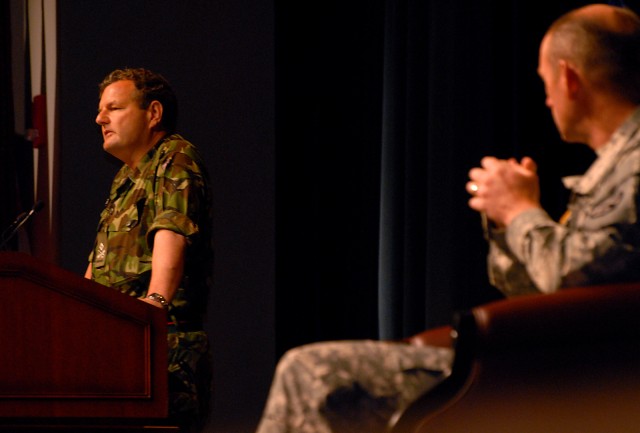
FORT LEAVENWORTH, Kan. (June 25, 2009) - The United States needs friends now and in the future and when there's difficult work, the United Kingdom is the first name on the team sheet, said British Army Maj. Gen. Graham Binns.
"For a medium-sized power, we've got a serious military, we've got global reach, and we're someone that you need alongside you in the future," he said.
Binns, set to be named commandant of the Joint Services Command and Staff College in the U.K. in September, traveled to Fort Leavenworth to speak June 23 during the sixth Eagle Owl exercise. Binns addressed officers from both the U.S. and United Kingdom staff groups.
The Eagle Owl exercise is conducted twice a year at Fort Leavenworth, bringing British officers in the Defence Academy of the U.K. to the U.S. Command and General Staff College for three weeks. British officers spend two weeks conducting brigade-level exercises using terrain in Kansas and Missouri. They spend a week sharing critical thinking skills with CGSC students in the Intermediate Level Education course.
Binns served as commander of all British forces in southern Iraq in 2007, during which he officially signed over responsibility of Basra back to Iraq. Binns also commanded troops as they entered that area in 2003.
Binns told U.S. and U.K. officers that although Americans and British are alike in culture and linguistics, they are different in their approach to use of power. As a British general told him in 2003: "We're going to fight with the Americans, alongside the Americans, but we're not going to fight like the Americans."
Where the U.S. Army has excelled, Binns said, has been in its ability to change and learn from its mistakes.
"You're an Army that has transformed through introspection and brutal honesty," he said.
Popular support for the wars in Iraq and Afghanistan is less in the U.K. than in the U.S. - and the conflict in Iraq is known as "(Former Prime Minister) Tony Blair's war and not (current Prime Minister) Gordon Brown's war."
"Trying to explain why we're in Iraq or Afghanistan around U.K. middle class dining rooms is difficult," Binns said. "To be honest, our soldiers do not enjoy the same popular support for operations as yours do."
The U.S. also has more resources than its counterparts in Europe to commit to stabilization, he said. While British troops were preparing for a drawdown, the U.S. was able to conduct a successful troop surge.
"We look at the U.S. and see a nation at war, you perhaps, look at your Department of State and wish they were supporting that war," he said. "The U.S. has the resources to give it the strategic patience to endure in conflict. The U.K. commits limited resources, for a limited time, to a limited location to take limited risks, and then it will go."
How the U.S. can improve, Binns said, is by discovering allied nations' intents before planning an operation. While serving as commander in Iraq, for example, Binns was told by U.S. commanders to send his troops to the Iranian border. This conflicted with British interests, he argued.
"You never place a multi-national commander in a position where he has to say 'no' because of his caveats," he said.
Binns said some things, such as the use of private security companies, give the U.S. a bad name.
Other countries aren't as comfortable with the use of force as Americans, Binns said, which has more do with cultural differences than rules of engagement or concern over laws. The American military tends to confront its problems head on.
"You might be right, because in the longer term it may prevent more force, but you've got to realize that culturally we're not the same when it comes to the use of force," he said.
Brig. Gen. Edward Cardon, CGSCAca,!E+deputy commandant, also addressed the students.
Cardon praised the U.K. for working well in multi-national situations. He said the power of personal relationships could not be overstated in building multi-national strength. Caveats, or a country's particular ethical concerns or intents, aren't bad unless they aren't shared, Cardon said.
He spoke to students about the challenges of educating the dwindling group of U.S. Army majors as the country is fighting two wars. Cardon said there are about 1,500 majors who are supposed to attend CGSC, but have not been able to do so. It could pose a problem when these officers become known as the "Iraq guys who don't get it," because they were trained for specific tasks rather than receiving a holistic education.
"I believe it's education that gives you the ability to see the changes in your environment," Cardon said. "It's education that gives you the ability to take all of these unknowns and say, 'Something is different and we have to adjust for it.'"

Social Sharing